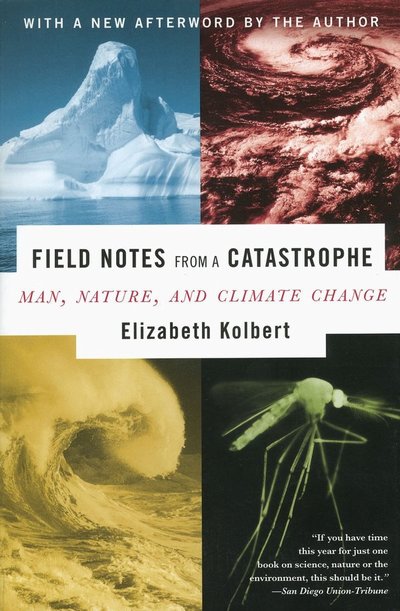March 29, 2007
Global warming essays chosen as next Common Book
It’s official: The next Common Book is Field Notes from a Catastrophe: Man, Nature, and Climate Change.
Earlier this month, 16 UW faculty members, administrators and students recommended Elizabeth Kolbert’s collection of essays about global warming as the 2007-2008 Common Book,
“The committee felt it time for the University to have this conversation,” said Jill McKinstry, director of Odegaard Undergraduate Library and co-chair of the selection committee.
Ed Taylor, UW vice provost and dean of undergraduate affairs, said Field Notes “will prompt our students to recognize it is vital to understand our global environment and to be good stewards of our world.” Taylor co-chaired the committee with McKinstry and approved the book choice.
The book grew out of “The Climate of Man,” a three-part series in The New Yorker during the spring of 2005. The series won wide recognition: the National Magazine Award, the National Academy of Sciences Communication Award and an award from the American Association for the Advancement of Science.
Field Notes will be distributed to approximately 5,500 new students this summer as part of their introduction to campus.
The book will also continue an all-campus discussion that began with the inaugural Common Book, Mountains Beyond Mountains by Tracy Kidder. He visited the Seattle campus as part of the program, as did Dr. Paul Farmer, subject of the story. As part Common Book events this coming year, the University plans to invite Kolbert to campus.
The 2007-08 selection committee, which first met in December, considered almost 20 books, narrowing its list to the Kolbert book and five others:
- Kindred by Octavia E. Butler
- The Worst Hard Time: The Untold Story of Those Who Survived the Great American Dust Bowl by Timothy Egan
- Respect by Sara Lawrence-Lightfoot
- The Bookseller of Kabul by Asne Seierstad
- The Sunflower: On the Possibilities & Limits of Forgiveness by Simon Wiesenthal.
Committee members considered 10 major criteria, including prose quality, appropriateness for freshmen, the writer’s assessment of a critical topic and the book’s ability to stimulate discussion. When Field Notes emerged as the front-runner, members sought opinions from UW faculty members knowledgeable about global warming.
Richard Gammon, professor of chemistry and oceanography, used Field Notes in a course on climate change and strongly endorses it. Many of the students in the course were freshmen, and they raved about the book, Gammon said. Kolbert gave a guest lecture in the course and met with Program on the Environment faculty and staff. “She is a gifted speaker and writer, very inspiring and engaging,” Gammon said.
The choice of Field Notes from a Catastrophe follows a February report from climate scientists around the world that for the first time says global warming is “unequivocal” and that humans are “very likely” causing most of the increase in Earth temperatures since 1950. Issuing its fourth report, the Intergovernmental Panel on Climate Change said that in coming years, temperatures will consistently rise but that fast action could mitigate damage.
According to the National Resource Center for the First Year Experience and Students in Transition at the University of South Carolina, 92 colleges and universities have programs similar to UW Common Book. Some are summer reading programs; others are part of freshman initiatives.
Sometime in the future, McKinstry said, the criteria for Common Book selection and ways to suggest books for consideration will be posted on the UW Common Book Web page: http://www.washington.edu/uaa/commonbook/.



